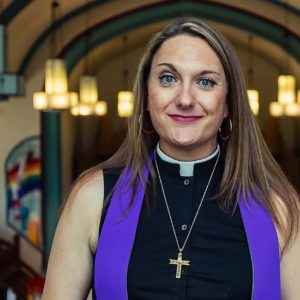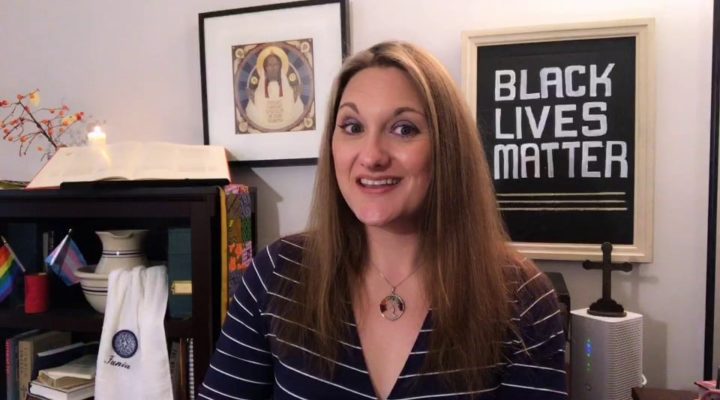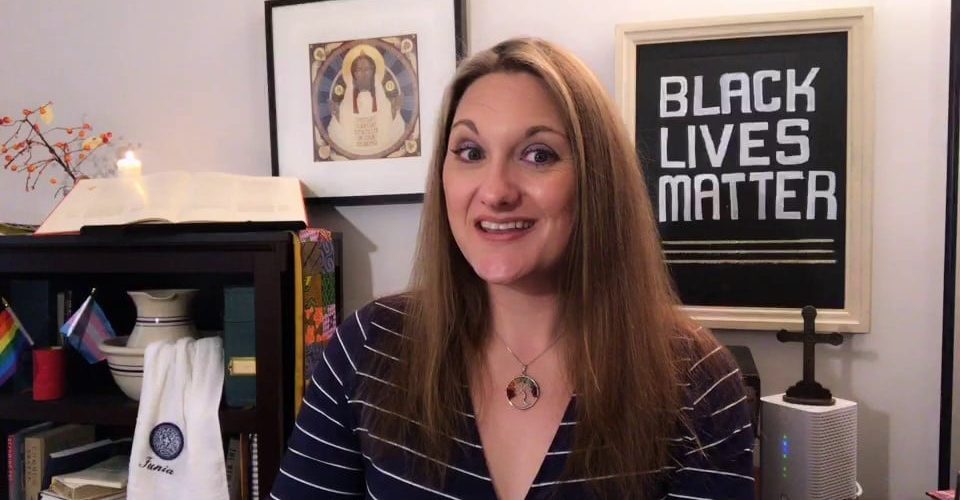Earlier this summer, June Joplin made international headlines when she used a Sunday morning sermon at her Baptist church to come out as transgender. Nearly three months later, more has changed than her gender.
The Canadian Baptist church she had served eight years as pastor narrowly voted to dismiss her and — in one of the few blessings of the coronavirus age — she has taken up an itinerant preaching ministry made possible by Zoom and Facebook Live.

June Joplin (Photo by Laur Bereznai)
Without leaving her home in suburban Toronto, Pastor June appears each Sunday in places as diverse as New Orleans, Boston or down the road in Toronto.
She spoke with Baptist News Global about her new life and experiences.
So much has changed in your life and work this summer. What are some things that haven’t changed that are anchors for you?
I’m still preaching most Sundays, so my weeks have a familiar rhythm — from text, to idea, to something like an outline, to the written word, and finally the spoken word. The process is relentless (even in unemployment), and it can be stressful. I do enjoy it, though.
I’m still running — in fact, I’ve signed up to run the same 5K I’ve run the past two years to raise money for Matthew House, and their work with refugee claimants. It’s a virtual race this year, which I think means I can run pretty much any time during October and send in my time and a photo. And I won’t have to rush across town after the race to go to church in person this year.
I’m still a parent, which means I’m having about as many conversations about Pokémon, memes and the NHL as I ever was. I’m also picking dirty clothes up off the floor and trying to decide what’s for dinner.
Shortly after coming out to my oldest child, he and I were in the car one afternoon. He said, “You know, I enjoy being around you as much as I always have, except now I’m with a girl.” I’m grateful that hasn’t changed.
How would you characterize the responses you’ve had from friends, family and even people you never met before?
One of the things I noticed early on is that the people who have kept talking to me are the people who support me and love me with no strings attached. I’ve still only received one critical message from anyone at my former church. I’ve gotten some hate mail — always anonymously — and I’m sure it’s still the case that there are plenty of people talking about me rather than to me.
The initial outpouring of support when the news came out was so wonderful. It was almost too much love and positivity to take in. I was moved to tears on a regular basis during those first couple of weeks. In some cases, I received loving words from unexpected places; and with some old friends and colleagues, conspicuous silence.
The effect this all has is, the responses that get to me are overwhelmingly positive, loving, and supportive. My best friends haven’t missed a beat — one of them messaged me the other day to say that he honestly can’t remember me having been anyone other than June. Another said that, even if she tried, she couldn’t remember my deadname anymore. One of my old neighbors told me she sees God’s love in me, that I look whole, that I look like grace and love, and that she’s glad I’m home. How beautiful!
What are you hearing from other trans folk who might have been inspired or shocked by your witness?
In my experience, trans people love and encourage their trans siblings. I get kind and caring messages from trans people almost every day. Sometimes it’s just as simple and sweet as “Hey, I thought you looked really beautiful in your last sermon video,” but often folks share extended accounts of the ways their faith journeys have interacted with their transitional journeys. A trans woman at a Baptist church in New England has been sending me regular updates as she and her pastors prepare a sort of liturgy for renaming and rebaptism. I think that’s lovely.
“I hope more churches will repent of their ignorance and create sanctuary for trans people to experience abundant life.”
I’m amazed by how many trans women seriously considered and even went to school for vocational ministry, and how many other closeted trans women are serving as clergy. I hope more churches will repent of their ignorance and create sanctuary for trans people to experience abundant life.
Occasionally, I’ll get some grief from a trans person who views religion with the same sort of hateful prejudice that conservative Christians have for LGBTQ people. It’s interesting to be caught between extreme views on either side, but that extremism seems to be rare among trans people.
Often, we talk about evangelism as bringing people to faith for the first time, of conversions and baptisms. But there’s another kind of evangelism that brings people back to faith when they’ve been estranged. How is that part of your current ministry?
I remember reading that about half of LGBTQ people in the U.S. are people of faith. I imagine that percentage is a bit lower here in Canada, but the figure is probably still significant.
It’s hard to be a trans person of faith — open, inclusive, welcoming voices in the church don’t speak with the same levels of volume and certainty as the hateful voices. That’s why I believe visibility is important. If people can see me and say, “Hey, she’s trans, and she’s a follower of Jesus, and she’s a pastor, and she’s doing it with grace, and she says I’m beloved,” maybe they can find inspiration to rediscover or rekindle their faith.
What’s it like to be an itinerant pastor in the age of coronavirus restrictions?
There are things I love about it. I don’t have to deal with the pressure to return to in-person worship services. I don’t have to sit through meetings about reopening protocols. I don’t have to feel the anxiety of whether or not we’re going to make budget. And on a personal level, I don’t have to answer theologically immature questions about whether or not it’s OK to be transgender, because the congregations that invite me to preach are generally the congregations that get it.
On the other hand, I do miss having people. Some of the supportive folks from my ex congregation threw me a socially distant, outdoor farewell party a few days ago, and it was bittersweet seeing all those loving faces (even behind masks) and knowing that we’re not connected in the same way as before.
It’s hard enough to be a guest preacher in a church with a physical presence — dropping in and out just for a Sunday. What are the additional challenges of being a guest preacher via video?
There is a disconnected feeling, but it comes with a silver lining. I’m not sure I have the emotional energy right now to connect with congregations physically — even if I were only visiting on a Sunday morning.
Preaching on video did not feel natural at first, but I do feel as if I’ve gotten the hang of it to some degree. It helps to see a woman in my monitor and to know that the woman I’m seeing is really and truly me.
What’s the most encouraging or surprising thing that’s happened to you in the past three months?
I have been surprised by all the media attention, and I have tried to conduct myself with as much poise and grace as possible. Talking to the New York Times was especially unexpected. I remember telling a close friend, shortly before coming out, “My guess is, Baptist News Global will probably do a story about me, but that’s probably all the attention I’ll get. It’s not like I’m going to get written up in the New York Times like Paula Stone Williams did.”
I guess I was wrong.
What’s next for you vocationally?
I wish I knew. I’m not terribly confident in my capacity to serve as a pastor again, but I feel like that’s where I’ll land by default. It’s a scary thing, though. The last time I set foot in a church building, I noticed a sort of panicky feeling I hadn’t felt before. And when folks have reached out to me about serving one place or another as a pastor, my anxiety spikes in a way I can’t ignore.
“I don’t really know how to work anyplace else than a church, but sometimes that feels like more of a curse than a blessing.”
I don’t really know how to work anyplace else than a church, but sometimes that feels like more of a curse than a blessing.
At the suggestion of a few of her pastor colleagues, my friend Elizabeth Mangham Lott set up a GoFundMe page for folks who’d like to support me and my family during this time of upheaval. Hopefully, people will continue to give generously enough that I can make my next vocational move more out of a sense of calling and less out of financial desperation.
And even though your public announcement is just a few months old, knowing this was something you wrestled with for years, any regrets at this point?
In terms of how I came out, and how I’ve chosen to be visible since coming out, I have no regrets at all. I know that my transition has kept some folks up at night, wrestling with the kind of consequential matters of faith churches are generally desperate to avoid. That wouldn’t have happened if I’d resigned on my own volition, gone away quietly or kept living a convenient lie.
In terms of broader timing, well, almost every trans person I know regrets not transitioning sooner. As someone transitioning in her early 40s, it’s easy to get stuck in that spiral. I am trying to learn to give myself grace and to recognize that transition itself is a grace. It’s miraculous that any of us get here, to this place of abundant life, given the enormous barriers we face.
Related articles:
Pastor reveals her true identity in live-streamed Sunday sermon
Church dismisses pastor who came out as transgender in Sunday sermon
Seven things I’m learning about transgender persons
Baptist church calls transgender pastor
Why being transgender is not a sin
Trans 101 for churches: ways to make a difference for transgender persons


